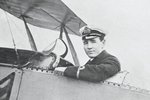Wildcat
Major
... Australia lost one of its greatest fighter pilots.
Time to recognise and remember a brilliant fighter pilot | theage.com.auIF STAN Dallas had ignored his father's advice, his grandchildren and their children might be gathering tomorrow for the 90th anniversary of the death of possibly our finest ever fighter pilot.
But when Dallas announced in a 1917 letter home that he was considering marrying a "wonderful" nurse he had met in a "rather romantic way", Peter Dallas responded with paternal caution. The upheaval and uncertainty of wartime was not conducive to wise matrimonial decisions, he warned. Better to wait until the war ended.
Stan accepted Peter's advice. Consequently, Stan never became a husband or father, and there were no grandchildren to pass on his remarkable story. This could be partly why this brilliant airman, who died 90 years ago tomorrow, is so little known.
Stan Dallas was an outstanding World War I pilot, acclaimed for his flying technique, fine leadership and engaging personality. The imposing tally of 32 victories the Queenslander amassed in aerial combat was a substantial under-estimate because he was so modest about claiming them. His real score was close to 48 or 50, more than any other Australian ace, although his friend Bob Little perhaps had more successes than his usually acknowledged 47. How Dallas died remains contentious.
Dallas loved the theatre, was good at rugby and a promising artist. But he had a passion for flying. He built model planes, corresponded with famous overseas aviators, and scrutinised birds in flight for hours. When war began in 1914 Dallas approached the embryonic Australian Flying Corps, but was advised to go to England. On arrival he contacted the Royal Flying Corps (RFC), but detected no interest in an aspiring aviator from the Queensland backblocks with no pedigree and an unorthodox pilot's physique. Dallas was 188 centimetres tall (six feet two inches) and weighed 102 kilograms (16 stone).
Another option, however, was the Royal Naval Air Service. Dallas was invited to sit a test with 83 other applicants. He came first, and was on his way. He was initially based at Dunkirk, guarding the English Channel and its coastline, and making occasional bombing raids. During 1916 Dallas developed into a superb pilot, able to manoeuvre a fighter plane, shoot accurately and, with his exceptional eyesight, detect distant adversaries. When German aircraft bombed Dunkirk in May, he ascended to counter-attack. Although outnumbered, he downed one of the bombers, and was recommended for the VC, but received the Distinguished Service Cross instead. In July, a French general awarded him the Croix de Guerre.
April 1917 was the RFC's worst month of the war. Manfred von Richthofen's notorious "Flying Circus" inflicted havoc. On 13 April six German planes downed 13 British machines. British pilots were surviving, on average, about a fortnight.
But the RFC's worst month was Dallas' best month. In his most acclaimed exploit he and New Zealand pilot T. G. Culling took on 14 of Richthofen's marauding Circus; after Dallas downed two and Culling another, the remaining Germans scattered. Next morning Dallas and Culling initiated another dogfight — although again severely outnumbered — with similar results.
Promoted to squadron commander, Dallas took newcomers under his wing and taught them the finer points. While some famous aces amassed imposing tallies as self-centred, lone-wolf predators, Dallas accompanied nervous novices up and manoeuvred them into a position where they could down an enemy plane while he protected them. In 1918 he consolidated his reputation as an outstanding pilot and leader. He was especially effective during the desperate days of defence in March-April 1918. One of his pilots described the spirit instilled by Dallas in the squadron as "simply wonderful". Even beyond his squadron Dallas was known as "that delightful Australian".
On 1 June, 90 years ago tomorrow, Dallas, aged 26, was shot down and killed. The circumstances of his death remain unclear. Some accounts describe him flying solo. Others have him accompanying an inexperienced pilot. Most versions presume that, despite his tactical mastery, he must have made an error. An alternative explanation, consistent with reports from observers of his last moments, is that he may have tried to rescue a British pilot unfamiliar to him who was in severe difficulties, and that he may have knowingly become vulnerable to more elevated German pilots in the process.
There was no doubt, however, about the devastating impact of his death. Decades later, a pilot Dallas had commanded wrote: "Throughout my life he has remained an idol for me — the nearest to a god I shall ever get."


